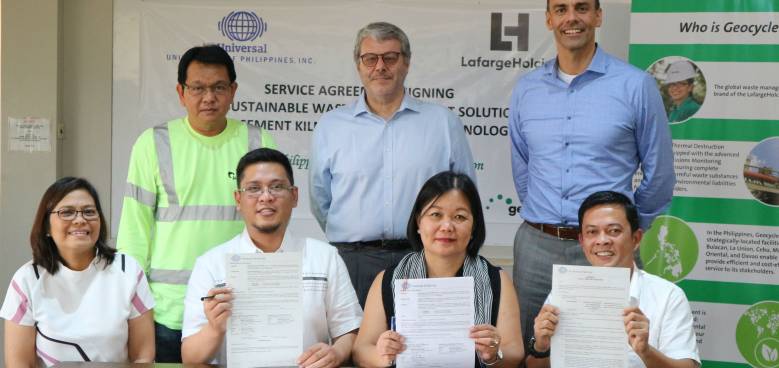Holcim’s Geocycle to provide sustainable waste management to Universal Leaf
Leading tobacco processor Universal Leaf Philippines Inc. (ULPI) has partnered with Geocycle, the waste management unit of Holcim Philippines, Inc., for environment-friendly and sustainable management of its byproducts by using those as alternative fuel in cement production.
Under the agreement, ULPI will send close to 750 tons of tobacco stems per month from its Agoo, La Union operations to Holcim’s plant in Bacnotan where those will be used as a substitute to traditional fuels in making cement in a method called co-processing.
A government approved and internationally recognized waste management technology, co-processing repurposes discarded materials from various industries into alternative fuels and raw materials using a cement kiln. The length of time materials stay inside kilns at extremely high temperatures prevents the formation of harmful gases. There is also no residue to be landfilled with this incorporated into the cement. Through co-processing, Holcim reduces its use of fossil fuels and provides public and private sector partners a sustainable waste management option.
Prior to the partnership with Geocycle, ULPI managed its wastes from tobacco processing through landfilling. The companies sealed the partnership at Holcim’s La Union plant on June 29.
ULPI Vice President for Internal Operations Ronel Montebon said the decision to switch to co-processing is part of a continuing program to improve the company’s waste management. The company cited co-processing’s environmental advantages such as the reuse of wastes as alternative fuel and environmental sound management of materials as reasons for the shift.
Environmental Management Bureau–Region I Director Ma. Victoria V. Abrera lauded the companies for their commitment to environmental stewardship and expressed support for Geocycle playing a more significant role in waste management in the region.
“I am very happy to witness this significant agreement between two companies putting waste to good use. Co-processing is important in addressing the challenge of waste management in the region with volumes steadily growing especially plastics,” she said.
As part of its sustainability commitment, Holcim Philippines aims to use as much as 30% of alternative fuels and raw materials such as qualified wastes in cement production by 2030. Last year, Holcim Philippines used 160,000 tons of such materials in place of traditional fuels.
- Holcim pushes for faster blended cement adoption in Philippines
- Holcim Philippines, Build Change seal partnership for disaster-resilient construction
- Holcim helps strengthen La Union vs. COVID-19 with vaccine donation
- Holcim shares greenhouse gas emissions reporting best practices to support Philippines climate action
- Holcim Philippines continues innovation, sustainability push to drive biz growth, positive impact




